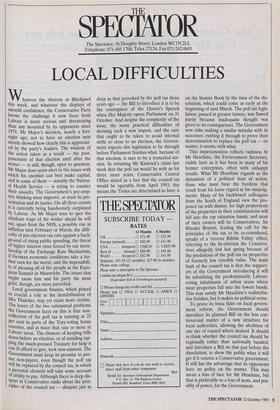SPECTATOR
The Spectator, 56 Doughty Street, London WC1N 2LL Telephone: 071-405 1706; Telex 27124; Fax 071-242 0603
LOCAL DIFFICULTIES
hatever the rhetoric at Blackpool
this week, and whatever the displays of smooth confidence, the Conservative Party knows the challenge it now faces from Labour is more serious and threatening than any mounted by its opponents since 1974. Mr Major's decision, nearly a fort- night ago, not to have an election next month showed how clearly this is appreciat- ed by the party's leaders. The wisdom of the action taken as a result — the post- ponement of that election until after the winter — is still, though, open to question. Mr Major does seem alert to the issues with which his enemies can best make capital, and in some of them — notably the Nation- al Health Service — is trying to counter their assaults. The Government's pre-emp- tive thinking must improve, as must its pre- sentation and its tactics. On all three counts it is currently being handsomely outplayed by Labour. As Mr Major tries to spot the elephant traps of the winter ahead he will See, apart from the NHS, a possible rise in inflation next February or March, the diffi- culty of pre-election tax cuts against a back- ground of rising public spending, the threat of higher interest rates forced by our mem- bership of the Exchange Rate Mechanism, if German economic conditions take a fur- ther turn for the worse, and the impossibili- ty of pleasing all of the people at the Euro- pean Summit in Maastricht. The issues that might cause him and his party the most grief, though, are more parochial.
Local government finance, which played so crucial a role in the destabilisation of Mrs Thatcher, may yet claim more victims. The lesser of the two substantial problems the Government faces on this is that non- collection of the poll tax is running at 25 per cent in parts of the Tory-voting home counties, and at twice that rate or more in Labour areas. The chances of keeping bills down before an election, or of avoiding tap- Ping the much-pressed Treasury for help it can ill afford to give, look non-existent. The Government must keep its promise to pur- sue non-payers, even though the poll tax will be replaced by the council tax, in which a personal element will take some account of ability to pay. Although there is deep dis- quiet in Conservative ranks about the prin- ciples of the council tax — disquiet just as deep as that provoked by the poll tax three years ago — the Bill to introduce it is to be the centrepiece of the Queen's Speech when Her Majesty opens Parliament on 31 October. And despite the complexity of the issue, the many practical difficulties of devising such a new impost, and the care that ought to be taken to avoid internal strife so close to an election, the Govern- ment expects this legislation to be through before Parliament finishes what, because of that election, is sure to be a truncated ses- sion. In rebutting Mr Kinnock's claim last week that the poll tax would be with us for three more years, Conservative Central Office stated as a fact that the council tax would be operable from April 1993; this means the Tories are determined to have it on the Statute Book by the time of the dis- solution, which could come as early as the beginning of next March. The poll tax legis- lation, passed at greater leisure, was flawed partly because inadequate thought was given to its consequences. The Government now risks making a similar mistake with its successor, rushing it through to prove their determination to replace the poll tax — no matter, it seems, with what.
This impetuousness reflects rashness by Mr Heseltine, the Environment Secretary, visible here as it has been in many of his former enterprises, often with unhappy results. What Mr Heseltine regards as the dynamism of a political man of action, those who must bear the burdens that result from his haste regard as his misjudg- ments. Many of his backbench colleagues from the South of England view the pro- posed tax with dismay, for high proportions of the properties in their constituencies will fall into the top valuation bands; and most of their owners will be Conservatives. Sir Rhodes Boyson, leading the call for the principles of the tax to be re-considered, speaks of a 'reverse Ribble Valley' effect, referring to the by-election the Conserva- tives allegedly lost last spring because of the predations of the poll tax on properties of formerly low rateable value. The main fault of the council tax is that the support- ers of the Government introducing it will be subsidising the predominantly Labour- voting inhabitants of urban areas where most properties fall into the lowest bands. This may satisfy Mr Heseltine's redistribu- tive fetishes, but it makes no political sense.
To prove its bona fides on local govern- ment reform, the Government should introduce its planned Bill on the less con- troversial matter of a new structure for local authorities, allowing the abolition of one tier of council where desired. It should re-think whether the council tax should be regionally rather than nationally banded, and introduce a Bill on that just before the dissolution, to show the public what it will get if it returns a Conservative government. It still has the advantage that its opponents have no policy on the matter. This may mean a loss of face for Mr Heseltine, but that is preferable to a loss of seats, and pos- sibly of power, for the Government.


























































 Previous page
Previous page